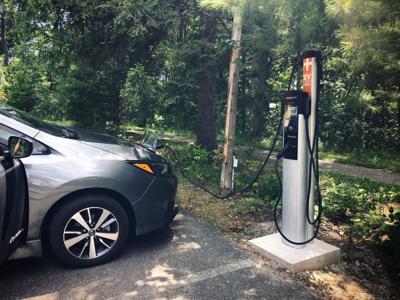CATSKILL — The Thomas Cole National Historic Site announced the installation of an electronic vehicle charging station, the first in Catskill.
The charging station, which was made possible by a donation from local residents and environmentalists Sara and Tom de Swardt, features two charging ports and allows two vehicles to charge at the same time. The station is open to the public at a fee of $1 per hour for the first four hours and $4 per hour for any additional time. The charging station will be available to members of the Thomas Cole National Historic Site at no charge.
“We believe that actions are important and that our work as a non-profit extends beyond our arts programming,” Executive Director Betsy Jacks said. “For that reason, our operations and their beneficial economic impact on the local economy as well as our impact on the local environment is of central importance to us. The Greening Initiative and the electric charger are action steps that we are taking to offer quality of life amenities to local community residents now and to preserve natural resources for future generations, including the local schoolchildren we serve each year.”
Hudson Talbott, who serves on the Cole Site board of trustees, called the development exciting.
“It opened up a lot of possibilities for us to look for what we can do to contribute to the greening of the Cole House,” Talbott said.
The charging station will help support community members in reducing carbon emissions to the environment, according to a statement from the Thomas Cole House.
“By installing the public charging station, the Thomas Cole Site is providing the local community and visiting audiences with an important resource to support electric vehicle drivers, and in turn support clean air in the Hudson Valley and combat local issues such as flooding, which can be traced in part to air pollution,” according to the announcement.
Talbott wants to extend the Thomas Cole vision to Catskill at-large.
“There are so many things that all of us can do to help support the environment,” he said. “It is within our power to help make a difference.”
The village of Catskill discussed installing two electric car chargers in the municipal lot on Willard Alley last fall.
The chargers will be purchased at no cost to the village because they are covered by a Main Street Facade grant, Elizabeth LoGuidice, founder of Resilient Communications and Consulting, said last September.
The village continues to work on the charging station, Village President Vincent Seeley said Thursday, adding that its progress has slowed due to the pandemic.
The chargers would help the village on its way toward its bronze designation in the state Department of Environmental Conservation’s Climate Smart Communities Program.
There are 311 Climate Smart Communities throughout the state, 47 of which have reached bronze level and four have attained silver. In Greene County, the villages of Athens and Catskill and towns of Cairo, Hunter and Jewett are registered as Climate Smart Communities. Climate Smart Communities in Columbia County include the city of Hudson, the villages of Kinderhook and Philmont, and the towns of Ancram, Austerlitz, Chatham, Copake, Ghent, Hillsdale, Kinderhook and New Lebannon.
Thomas Cole Site’s new charging station is part of its Greening Initiative, inspired by the artist.
In Cole’s 1838 poem ‘Lament of the Forest,’ he warned, “A few short years!—These valleys, greenly clad, these slumbering mountains, resting in our arms, shall naked glare beneath the scorching sun.”
“Thomas Cole could be characterized as America’s first environmentalist,” Talbott said. “We feel it incumbent upon us to really manifest [his values] ourselves in a concrete way, what can we do to exemplify what he believed in.”
The Thomas Cole Site completed its first phase of the initiative this summer, which included mowing less frequently, planting pollinator gardens, using 100% recycled paper for office printing, reusing exhibition cases, switching to refillable coffee pod/filters and reusable soap containers.
Future steps include converting to renewable energy, using only sustainably sourced and recycled materials for printed materials, switching to environmentally friendly office products and starting a composting system.
Former EPA Regional Administrator and Beyond Plastics founder Judith Enck commended the Thomas Cole Site for its efforts.
“I looked at the Thomas Cole site sustainability commitments and was mightily impressed,” Enck said. “It is terrific that they are honoring the environmental ethic of Thomas Cole and putting his intellectual commitments into practice. They are now a model for other historic sites around the state.”
When it comes to environmental sustainability, time is of the essence, Talbott said.
“It is imperative we stick up for the environment,” Talbott said. “Now is the time.”
Jacks echoed similar remarks.
“In the community of Catskill, across the country and around the world, our stewardship of the earth is more important than ever as harmful changes to our environment are reaching a point of no return,” she said.









